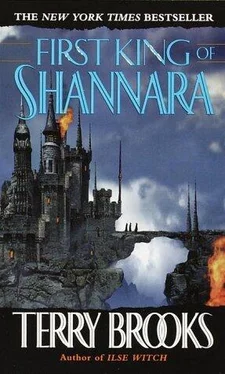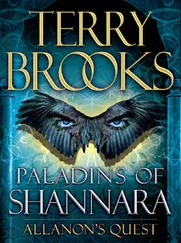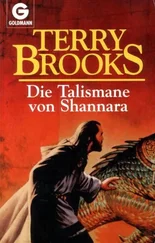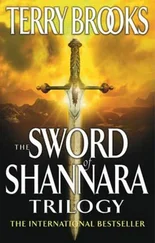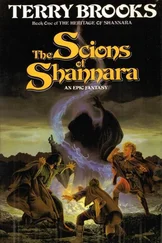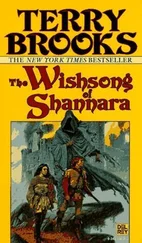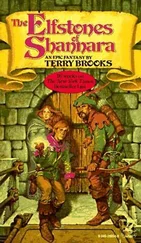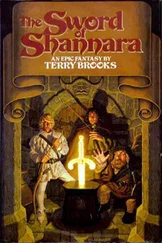When he was twenty he came down out of the Ravenshorn to Culhaven and entered into the service of Raybur, newly crowned King of the Dwarves and a much admired warrior himself. But Raybur kept him in Culhaven only a short time before sending him to Paranor and the Druids. Raybur recognized Risca’s special talents and believed the Dwarf people would be best served if the young man with the warrior’s heart and the hunter’s skills was trained by the Druids. He, too, like Courtann Ballindarroch of the Elves, knew of Bremen and admired him. So a note was addressed to the old man, asking that he consider giving young Risca special consideration as a student. Thus bearing the note, Risca traveled to Paranor and the Druid’s Keep and stayed, becoming a staunch follower of Bremen and a believer in the ways of the magic.
His eyes stayed fixed on the black silken tent in the enemy camp below as he thought of the ways in which the magic now served him. His was the strongest after Bremen’s— stronger these days perhaps, given his youth and stamina and the other’s age. That was what he firmly believed, though he knew Tay Trefenwyd would certainly argue the matter. Like Tay, Risca had studied assiduously the lessons taught by Bremen, working at them even after the old man was banished, testing himself over and over again. He studied and trained virtually alone, for no others among the Druids, even Tay Trefenwyd, considered themselves warriors or sought to master the battle arts as he did. For Risca, the magic had but a single useful purpose—to protect himself and his friends and to destroy his enemies. The other uses of magic were of no interest to him—healing, divining, prescience, empathies, mastery of the sciences, elementalism, history, and conjuring. He was a fighter, and strength of arms was his passion.
The memories came and faded, and his thoughts returned to the matter at hand. What should he do? He could not abandon his responsibilities, but he could not ignore who he was either. Below, the silken folds of the tent seemed to ripple in the faint dance of the firelight. One blow was all it would take. How easily their problems would be solved if he could deliver it!
He took a deep breath and let it out slowly. He was not afraid of Brona. He was aware of how dangerous the other was, how powerful, but he was not afraid. He possessed considerable magic himself, and if he employed it in a direct strike, he did not think that anyone or anything could withstand it.
He closed his eyes. Why was he even considering this? If he failed, there would be no one to give warning to the Dwarves! He would have given his life for nothing!
But if he were to succeed ...
He eased back into the rocks, slipped off his travel cloak, and began to strip away his weapons. He supposed his mind had been made up from the moment the idea had entered his head. Kill the Warlock Lord and put an end to this madness. He was the best suited of any of them to make the attempt. This was the ideal time, when the Northland army was still close to home and Brona believed himself safe from attack. Even if he died, too, it would be worth it. Risca was willing to make that sacrifice. A warrior was always prepared to make that sacrifice.
When he was down to his boots, pants, and tunic, he shoved a dagger in his belt, picked up his battle-axe, and started down through the rocks. It was nearing midnight by the time he reached the foot of the mountains and started across the plains. Overhead, the Skull Bearers still circled, but he was behind them by now and cloaked in magic that concealed him from their spying eyes. They were looking outward for enemies and would not see him. He walked easily, loosely, his approach silent in the black, the light of the campfires masking him from those who might notice his approach. Their sentry system was woefully inadequate. A perimeter of guards, a mix of Gnomes and Trolls, had placed themselves too far apart and too close to the light to be able to see anything coming in out of the dark. The skies were clouded and the night air was hazy with smoke, and it would take sharp eyes under the best of circumstances to catch sight of any movement on the plains.
Still, Risca took no chances. He came in at a crouch when the cover of grasses and scrub thinned, picking his place of approach carefully, choosing one of the Gnome sentries as a target. Leaving the battle-axe in the long grass, he went in with only the dagger.
The Gnome sentry never saw him. He dragged the body back out into the grasses, concealed it, wrapped himself in the fellow’s cloak, pulled up the hood to hide his face, picked up the axe again, and started in.
Another man would have thought twice about just walking right up to an enemy camp. Risca gave it barely any thought at all.
He knew that a direct approach was always best when you were trying to catch someone off guard, and that you tended to notice less of what was right before your eyes than of what lurked at the fringes of your vision. The tendency was to discount what didn’t make sense, and a lone enemy strolling right past you into the center of your own heavily armed camp made no sense at all.
Nevertheless, Risca stayed at the edges of the firelight as he entered, and he kept the cloak in place. He did not skulk or lower his head, for that would signal that something was wrong. He moved as if he belonged and did not alter his approach. He passed the outer perimeter of guards and fires and moved into the center of the camp. Smoke wafted past him, and he used it like a screen.
Shouts and laughter rose all about, men eating and drinking, telling tales and swapping lies. Armor and weapons clinked, and the pack animals stamped and snorted in the hazy dark. Risca moved through them all without slowing, never losing sight of his destination, now a ragged jut of poles and dark pennants lifting above the swarm of the army. He carried the battle-axe low against his side, and he projected himself through his magic as a soldier of no consequence, as just another Gnome Hunter on his way to somewhere unimportant.
He passed deep into the maze of fires and men, skirting wagons and stacks of supplies, tethered lines of pack animals and menders engaged in repair of traces and equipment, and vast racks of pikes and spears, their shafts and armored tips angling skyward. He kept to the portions of the camp that were occupied by Gnomes when he could, but now and again was forced to pass through clusters of Trolls. He shied from them as a Gnome might, deferential, wary, not showing fear, but not challenging either, turning away from them as he approached, not quite meeting the craggy, impersonal faces, the battle-hardened stares. He could feel their eyes settle on him and then move away. But no one stopped him or called him back. No one found him out.
Sweat ran down his back and under his arms, and it was not from the heat of the night. Now men were beginning to sleep, to roll themselves into their cloaks next to the fires and go quiet.
Risca went more swiftly. He needed the noise and the bustle to mask his movements. If everyone slept, he would seem out of place still moving about. He was closing on the Warlock Lord’s haven now—he could see its canopy lifting against the darkness ahead. The number of fires was thinning out as he approached, and the number of soldiers about them was dwindling. No one was allowed to come too close to the quarters of the Warlock Lord, and none wished to. Risca stopped at the edge of a fire where a dozen men lay sleeping. Trolls, huge, hard-featured fighters, their weapons lying next to them. He ignored them, studying the open ground ahead. A hundred feet separated the black tent on all sides from the sleeping army. There were no sentries to be seen. Risca hesitated. Why were there no guards? He glanced about carefully, searching for them. There were none to be found.
Читать дальше
